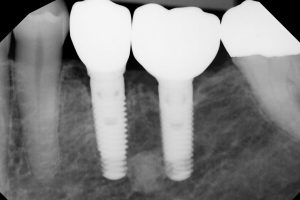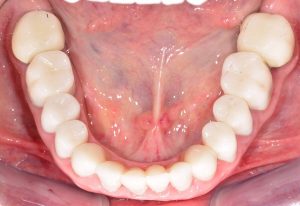Understanding Dental Implant Candidacy: Who’s a Good Candidate?
Dental implants are one of the best ways to restore missing teeth, but they’re not for everyone. While these implants offer a sturdy and natural-looking replacement for missing teeth, certain factors determine whether they’re the right choice. Auburn, IN dentist, Dr. Nate Heffelfinger offers thorough evaluations to help patients in Auburn, Garrett, Kendallville, Fort Wayne, and nearby areas determine if they’re suitable candidates for dental implants.
For more information about candidacy for dental implants, contact Smiles for Life by calling 260-925-4290.
Determining Candidacy for Dental Implants

- Adequate Jawbone Density: Implants need a solid foundation, so sufficient bone density in the jaw is necessary. The implant post must fuse to the jawbone in a process called osseointegration. Dr. Heffelfinger will assess the bone density to ensure your jaw can support an implant. If bone loss has occurred, supplemental procedures may be recommended.
- Healthy Gums: Healthy gums are essential for implant success. Patients with untreated gum disease may need to undergo periodontal treatment before becoming eligible for implants. Healthy gum tissue helps support the implant, ensuring a stable and lasting solution.
- Good Health: Dental implant placement is a surgical procedure, so candidates should be in good health. Certain conditions, such as uncontrolled diabetes or autoimmune disorders, may impact healing and implant integration. Dr. Heffelfinger will discuss any medical conditions to determine if implants are a safe option.
Factors Influencing Candidacy
Several factors can influence a person’s candidacy for dental implants. These factors include oral health, jawbone density, overall health, and lifestyle habits.
Oral Health
Good oral health is essential for the success of dental implants. Candidates for dental implants should have healthy gums and teeth, with no signs of periodontal disease or untreated oral infections. Periodontal disease, also known as gum disease, can lead to bone loss and compromise the stability of the implant. Active gum disease requires treatment before dental implant surgery can be performed. Additionally, candidates should have a good oral hygiene routine, including regular brushing, flossing, and dental check-ups.
Jawbone Density
Sufficient jawbone density is necessary to support the dental implant. The jawbone should be dense enough to provide a stable foundation for the implant post. In cases where the jawbone is too thin or soft, bone grafting procedures may be necessary to augment the bone density. Bone grafting involves transplanting bone tissue from another part of the body or using synthetic bone material to build up the jawbone.
Overall Health
Health is also an important factor in determining candidacy for dental implants. Candidates should be in good general health, with no medical conditions that could compromise the success of the implant. Certain medical conditions, such as diabetes, heart disease, or autoimmune disorders, may require special consideration and modified treatment plans. Additionally, candidates should disclose any medications they are taking, as some medications can affect the body’s ability to heal and integrate the implant.
By understanding these factors, candidates can make an informed decision about their suitability for dental implants and take the necessary steps to ensure the success of the procedure.
Supplemental Procedures
If you don’t meet all the requirements for dental implants, don’t worry—additional treatments can often help make you a candidate. These supplemental procedures are tailored to each patient’s needs and can significantly improve the chances of a successful implant.
- Bone Grafting: If you lack adequate jawbone density, bone grafting can help. In this procedure, a bone graft material is added to the jaw to create a more solid foundation for the implant. This step may add a few months to the process but can be essential for long-term implant stability.
- Sinus Lift: For patients missing upper back teeth, a sinus lift may be necessary to create more room for implants. This involves lifting the sinus membrane and adding bone to the upper jaw to support implants in this area.
- Periodontal Treatment: If gum disease is present, Dr. Heffelfinger may recommend periodontal treatment before the implant procedure. This can include scaling, root planing, or even laser treatments to remove infection and encourage healthier gum tissue.
Additional Factors That Affect Candidacy

- Age and Development: Dental implants are typically only recommended for adults, as young patients may still have developing jaws that could impact implant placement.
- Commitment to Oral Hygiene: Implant success relies heavily on good oral care. Patients must be committed to maintaining oral hygiene through regular brushing, flossing, and dental visits, similar to the care required for natural teeth.
- Non-Smoker (or Willing to Quit): Smoking can hinder healing and compromise the success of dental implants. Dr. Heffelfinger may recommend that smokers quit before undergoing the implant procedure.
Frequently Asked Questions
No, those with active gum disease or an untreated oral infection won’t be a good candidate for dental implants. The implant placement procedure requires a healthy jawbone and gums, so any active gum infections or disease must be treated before the tooth implant can be placed.
Smoking can affect the healing process and increase the risk of implant failure, so individuals who smoke may not be good candidates for dental implants. Your dentist or oral surgeon will evaluate your oral health, including your smoking history, to determine if dental implants are a suitable option for you.
Individuals with systemic diseases such as diabetes, Parkinson’s disease, and certain autoimmune disorders may be at an increased risk for implant complications and infections. Similarly, those suffering from osteoporosis, or taking medications for bone deterioration, may also have a higher likelihood of implant complications.
Start Your Journey Toward a Restored Smile
Determining dental implant candidacy is an important first step toward restoring your smile. At Smiles for Life, Dr. Heffelfinger is dedicated to guiding patients through the process and recommending solutions for their unique needs. If you’re considering dental implants in Auburn, Garrett, Kendallville, Fort Wayne, or the surrounding areas, contact Smiles for Life by calling 260-925-4290 to schedule a consultation and find out if this transformative option is right for you.
